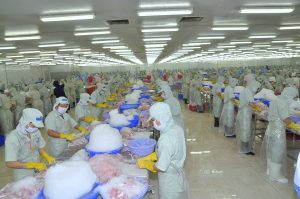Vietnamese police have arrested the trade unionist Vu Minh Tien, the latest labor activist to have fallen afoul of the ruling Communist Party of Vietnam (CPV).
Project88, an international nonprofit that campaigns for freedom of speech in Vietnam, said in a statement on Monday that Tien, the head of policy and legal affairs at the Vietnam General Confederation of Labor (VGCL), was detained under Article 337 of the country’s criminal code. The article criminalizes the “deliberate disclosure of classified information; appropriation, trading, [and] destruction of classified documents.” The statement did not mention the date of Tien’s arrest, only that he was last seen in public on March 21 at a workshop in Ho Chi Minh City.
Tien’s arrest comes on the heels of the arrest of Nguyen Van Binh, director general of the Ministry of Labor’s legal affairs department, on the same charge. Both men were working to bring Vietnam’s labor law into line with international standards. In his role at the VGCL, Vietnam’s state-controlled confederation of trade unions, the Project88 noted that Tien was working to amend the Trade Union Law, which is due to be signed into law by the National Assembly later this year. Tien also served as director of the Institute for Workers and Trade Unions (IWTU), another state-sanctioned body that conducts research on labor issues and provides policy advice to the Vietnamese government.
Meanwhile, Binh had worked with the International Labor Organization (ILO) and other international partners in order to secure the ratification of Convention 87, concerning freedom of association and the protection of the right of workers to organize.
All this is to say that Tien and Binh were no renegade dissidents; both were working very much within the system, in pursuit of goals sanctioned by the Vietnamese government. Hanoi agreed to labor reforms during the negotiations leading up to the free trade agreement with the European Union, which came into effect in 2020, and the Comprehensive and Progressive Agreement for Trans-Pacific Partnership trade pact, which it signed in 2018.
The question of independent labor organizing is also pertinent to Vietnam’s bid for the United States government to reclassify it under the U.S. Tariff Law as a “market economy,” which would provide Vietnam with significant economic benefits. But in order to qualify, Hanoi has to show that its labor regulations are in line with international standards and that workers’ wages in Vietnam are “determined by free bargaining between labor and management,” as the U.S. government puts it.
In a statement earlier this month, the advocacy group Human Rights Watch (HRW) said that despite the Vietnamese government’s claims to the contrary, “As a matter of law and practice, Vietnam does not allow independent unions to represent workers.”
According to HRW, Vietnam’s 2021 labor code provides for “enterprise-level worker organizations,” and its Trade Union Law provides for “trade unions” as well as “worker representative organizations.” But in practice these bodies, when and where they exist, are “almost all led by people appointed by management at the enterprise level.” They are also forced to affiliate with the VGCL, which is controlled by the government.
It also points to the political crackdown that has paralleled Vietnam’s recent leadership upheavals, which has both intensified and spread to government-adjacent civil society activists. Over the past two years, Vietnam has arrested a number of prominent experts and activists, including environmental activists who had been working with the government in support of its decarbonization goals. The CPV’s staunch opposition to independent journalism and human rights activism is nothing new, but this new wave of arrests seems to suggest a narrowing of the scope for any political activity that is not directly connected to the CPV or the government.
In March, the Project88 published a leaked Vietnamese government directive calling for further restrictions against the activities of civil society groups, including trade unions, and increasing scrutiny of foreign organizations and Vietnamese nationals traveling abroad. Directive 24, as it is known, seems designed to ensure that Vietnam’s increasing economic openness is not matched by political openness that could potentially undermine the CPV’s monopoly on power. Directive 24 called on the Party to counter the influence of “hostile and reactionary forces” taking advantage of the country’s increased openness to the outside world.
This suggests that Tien and Binh were likely arrested due to the outward-facing nature of their work, which brought them into contact with the exact sorts of “hostile and reactionary forces” – i.e. foreign governments, United Nations agencies, and international labor activists – outlined as threats in Directive 24.
As a result, rights groups say, the arrests of Tien and Binh offer evidence that the Vietnamese government has little intention of honoring the labor reform pledges attached to its recent economic agreements. Project88 noted in its statement that implementation of the EU-Vietnam Free Trade Agreement’s provisions on labor rights had been “anything but smooth.” In 2021, it said, two Vietnamese civil society activists who attempted to form an independent monitoring group were arrested on false charges of tax evasion – the same charge levied at several detained environmentalists.
In its coverage of Tien’s arrest, Radio Free Asia quoted one Vietnamese human rights advocate as saying that Vietnam’s democratic partners had been naive in assuming that it would comply with terms of agreements that potentially threatened the CPV’s hold on power. “When participating in economic agreements, Hanoi initially pretends to comply with the terms,” the activists said. “However, they soon find ways to arrest many activists, from environmentalists to civil society leaders, and now trade union advocates.”

































